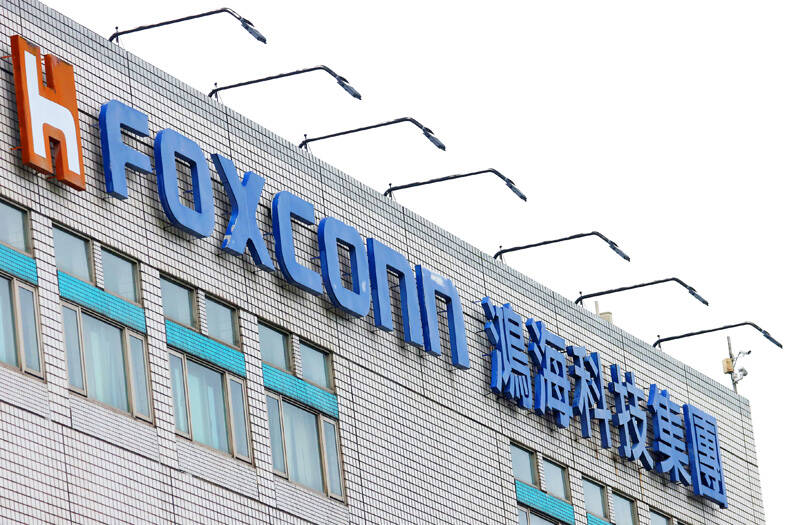A subsidiary of Hon Hai Precision Industry Co (鴻海精密) is planning to dispose of its indirect minority stake in China’s Tsinghua Unigroup Co (清華紫光), the latest sign that Beijing’s chip industry is becoming increasingly isolated from the rest of the world.
Hon Hai’s China-listed Foxconn Industrial Internet Co (FII, 富士康工業互聯網) is planning to sell the shares to Yantai Haixiu IC Investment Center (煙臺海秀積體電路產業投資中心) for no less than 5.38 billion yuan (US$771.5 million), a Taiwan Stock Exchange filing showed on Friday.
Hon Hai said in a separate statement on Saturday that it decided to sell the stake to avoid uncertainty because the investment still cannot be finalized.

Photo: Reuters
The iPhone assembler said the decision to sell the Tsinghua Unigroup stake was also aimed at allowing the company to have more flexibility in capital management.
The New Taipei City-headquartered company’s interest in the Chinese chipmaker, despite being relatively small, triggered concerns from the government because state-backed Tsinghua Unigroup is one of the most prominent semiconductor companies in China.
The Ministry of Economic Affairs would still fine Hon Hai for investing in Unigroup without informing the government, the ministry said in a statement on Saturday.
The ministry earlier said that Hon Hai could face a fine of up to NT$25 million (US$814,067).
FII holds the Unigroup stake indirectly through Xingwei (Guangzhou) Industrial Investment Partnership Ltd (興微廣州產業投資).
Xingwei invested in Beijing Zhiguangxin Holding Co (北京智廣芯控股), the parent company of Tsinghua Unigroup, via an affiliate, a previous filing showed.
The share sale would be completed no later than March 15 after drafting a report assessing the Chinese chip firm’s value, Hon Hai said.
Beijing’s efforts to develop a self-sufficient chip supply chain at home are facing mounting challenges, with the US and its allies poised to jointly restrict Chinese firms’ access to advanced semiconductor technologies.
The US government last week included dozens of Chinese technology companies on its so-called Entity List, making it almost impossible for them to procure critical foreign components, and ratcheting up a trade conflict between the world’s two largest economies.
Washington’s action followed the administration of US President Joe Biden’s implementation of tough export controls two months ago to prevent China from buying or making cutting-edge semiconductors — crucial for the Asian nation to leapfrog the US in areas such as artificial intelligence and supercomputing.
Key US allies, including the Netherlands and Japan, are planning to adopt at least some of the new US rules.

POWERING UP: PSUs for AI servers made up about 50% of Delta’s total server PSU revenue during the first three quarters of last year, the company said Power supply and electronic components maker Delta Electronics Inc (台達電) reported record-high revenue of NT$161.61 billion (US$5.11 billion) for last quarter and said it remains positive about this quarter. Last quarter’s figure was up 7.6 percent from the previous quarter and 41.51 percent higher than a year earlier, and largely in line with Yuanta Securities Investment Consulting Co’s (元大投顧) forecast of NT$160 billion. Delta’s annual revenue last year rose 31.76 percent year-on-year to NT$554.89 billion, also a record high for the company. Its strong performance reflected continued demand for high-performance power solutions and advanced liquid-cooling products used in artificial intelligence (AI) data centers,

SIZE MATTERS: TSMC started phasing out 8-inch wafer production last year, while Samsung is more aggressively retiring 8-inch capacity, TrendForce said Chipmakers are expected to raise prices of 8-inch wafers by up to 20 percent this year on concern over supply constraints as major contract chipmakers Taiwan Semiconductor Manufacturing Co (TSMC, 台積電) and Samsung Electronics Co gradually retire less advanced wafer capacity, TrendForce Corp (集邦科技) said yesterday. It is the first significant across-the-board price hike since a global semiconductor correction in 2023, the Taipei-based market researcher said in a report. Global 8-inch wafer capacity slid 0.3 percent year-on-year last year, although 8-inch wafer prices still hovered at relatively stable levels throughout the year, TrendForce said. The downward trend is expected to continue this year,

Vincent Wei led fellow Singaporean farmers around an empty Malaysian plot, laying out plans for a greenhouse and rows of leafy vegetables. What he pitched was not just space for crops, but a lifeline for growers struggling to make ends meet in a city-state with high prices and little vacant land. The future agriculture hub is part of a joint special economic zone launched last year by the two neighbors, expected to cost US$123 million and produce 10,000 tonnes of fresh produce annually. It is attracting Singaporean farmers with promises of cheaper land, labor and energy just over the border.

US actor Matthew McConaughey has filed recordings of his image and voice with US patent authorities to protect them from unauthorized usage by artificial intelligence (AI) platforms, a representative said earlier this week. Several video clips and audio recordings were registered by the commercial arm of the Just Keep Livin’ Foundation, a non-profit created by the Oscar-winning actor and his wife, Camila, according to the US Patent and Trademark Office database. Many artists are increasingly concerned about the uncontrolled use of their image via generative AI since the rollout of ChatGPT and other AI-powered tools. Several US states have adopted